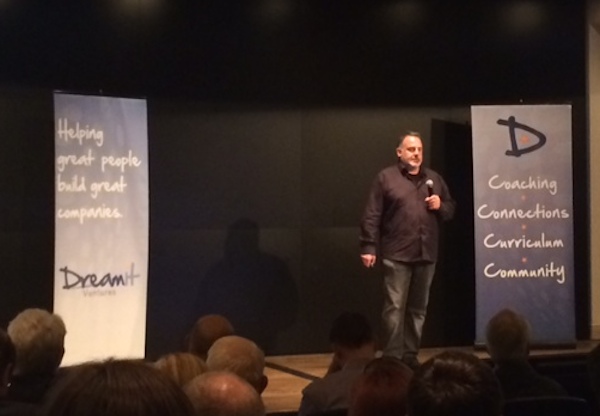The second batch of companies to come out of DreamIt Ventures’ Austin incubator program pitched to a full room of investors today.
Nine companies presented as part of the demo day, which allotted founders seven minutes to make a convincing case for why their company will be successful. VentureBeat has rounded up the five most promising startups, which you can check out below.
SecondMic
SecondMic is a service that lets you listen to an audio feed for unofficial sports commentary during a live game or create a channel where you can offer your own commentary that others can tune in to. This seems like a relatively simple function, but since sports games are most exciting when watched live, experiencing a delay on an audio feed for outside commentary can be annoying. That’s why SecondMic built a patent-pending technology for syncing audio with live games that offers a delay of 40 milliseconds or less.
Right now the service is only available for college and NBA basketball games, but the startup has plans to expand to other sports in the near future. SecondMic founder Francisco Prat told me the startup will generate revenue through promotional partnerships with big brands. SecondMic claims that users have logged 300 hours listening to custom sports commentary since launching a beta version of the service six weeks ago.
Swan
If there’s a gem among this year’s DreamIt Austin bunch, it’s most definitely Swan. The startup’s service lets you book appointments with beauty professionals (hair stylists, nail techs, massage therapists, etc.) at a location of your choosing. Users can pay for these services directly though Swan’s iOS app, and beauty professionals get paid via their own PayPal account at the time of the transaction.
Founder Julia Andalman told VentureBeat that Swan is appealing on two levels: Customers love having professionals come to them, and professionals in turn get a chance to book appointments during times that are usually spent doing nothing at a salon. Andalman said the startup only needs 1,200 customers to reach $1 million in revenue annually. Swan is only available in Austin and Dallas, but Andalman said she wants to launch in New York City, San Francisco, and Chicago in the near future.
Livewire
Livewire‘s business is based on the premise that taxes are difficult to file for most of us — even for the so-called professionals at companies like H&R Block that usually have no formal training in accounting. Its solution? Build a service that lets you video conference with a trained accountant to file your taxes and ensure everything is in order. Livewire said its service is superior to the Liberty Tax Services of the world because their people are better qualified and are often less costly. It also offers an advantage over tax software because it allows Livewire (or the professional working on your taxes) to be accountable for errors should the IRS audit you. The startup has 10 full-time employees and is raising a seed round of funding.
EyeQ
EyeQ wants to bring physical retail stores better information about customer activity while in the store. It does this in three main ways: collecting usage data from touchscreen displays within the store, using the on-board camera on those displays to anonymously determine demographic data on that customer (age, gender, etc.), and tracking movements within the store from a customer’s smartphone (provided that customer has Wi-Fi enabled). EyeQ’s service is currently in beta testing and has four retail stores signed up.
The startup generates revenue by charging a fee for each device it sets up within a store. EyeQ CEO Michael Garel said he’d also like the service to eventually help bridge the gap for businesses that operate both physical and online retail stores, but such a move would require customers to opt in to sharing their shopping data first.
Octane Lending
Obtaining loans for any type of powersport vehicle (motorcycles, ATVs, UTVs, PWCs, etc.) is different than for regular automobiles, and it hurts your credit each time a loan application is sent. On top of that, the process dealerships have to go through to apply for loans on these vehicles is also unique in that they have to fill out an application for each bank they solicit loans from for each customer. As you can imagine, this process isn’t exactly great for dealership businesses.
Austin-based Octane Lending built a SaaS platform that simplifies this process, allowing powersport dealers to fill out information once and then seek out banks for a loan. The startup has also set up a pre-approval loan process that prevents a dealer’s customers from taking a hit on their credit score. Cofounder Jason Guss told me after the demo that the company will generate revenue by charging a flat fee for each approved loan. This allows powersports dealers to use the service for free. The startup already has 41 dealers using the service and loan agreements with four banks.
VentureBeat's mission is to be a digital town square for technical decision-makers to gain knowledge about transformative enterprise technology and transact. Learn More

